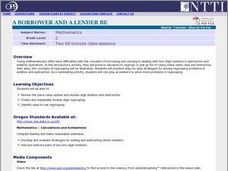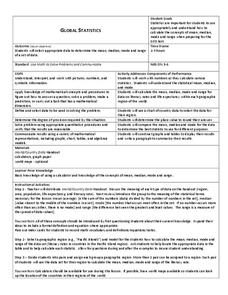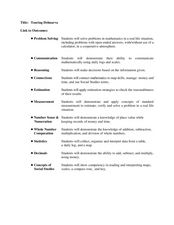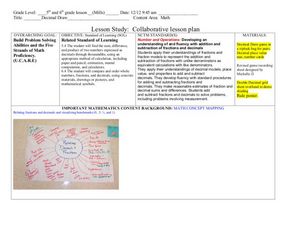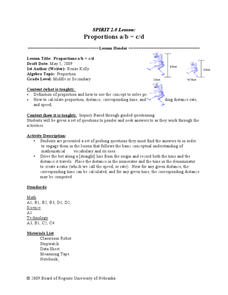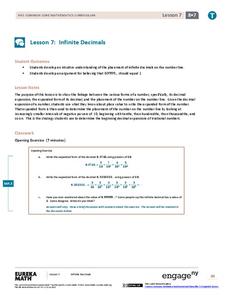Microsoft
Coordinates
What are your coordinates? After learning about coordinate systems in the real world, scholars see how a three-dimensional coordinate system works in Minecraft. They write a program to produce a compass rose and conduct an activity where...
Curated OER
Hula Hoop Hullabaloo
Second graders use hula hoops to represent the zero as they count objects into ones, tens, hundreds and thousands. They complete an activity to after they have practiced counting objects.
Curated OER
Geo Jammin' By DeSign - Day 2, Lesson 11: A Stitch in Time
Students investigate the culturally artistic value of quilts, the importance of trade in meeting basic needs, and the conservation of natural resources.
Curated OER
The Value of Water
Students determine the amount of water used or misused daily in a home. They identify ways to conserve use of water. They discuss why water is essential for day-to-day living and how water contributes to the standard of living for...
Curated OER
Egg Carton Math
Students recognize numbers 1-10 from a flash card held by the teacher and put the amount of beans in an egg cartoon that corresponds to the number the teacher holds up. After a lecture/demo, students play the game on their own.
Curated OER
Places and Production
Learners calculate United States GDP and GDP per capita, use a choropleth map to acquire information, and create choropleth maps of GDP per capita in South America. They identify regions with high and low GDP per capita
Curated OER
Coin Carnival
Learners investigate the value of coins. In this coin value lesson, students read The Penny Pot by Stuart Murphy. Learners expand on skills learned in the book and engage in activities to determine the value of a mixed set of coins while...
Curated OER
Circles-Diameter, Circumference, Radius and the Discovery of Pi
Seventh graders measure the diameter, circumference and radius of a circle and find pi using the diameter and circumference. In this geometry lesson, 7th graders work in groups to find the diameter, radius, and circumference of circles....
Curated OER
Write Me Two Ways
Fifth graders write numbers in standard and expanded form. For this writing numbers in standard and expanded form lesson, 5th graders write integers up to billions in word form and standard form. Students use number cards to create...
Curated OER
A Borrower And A Lender Be
Second graders practice addition and subtraction in this fun, technology-based Mathematics lesson for the second grade classroom. The lesson includes resource links, video clips, interactive websites, and a section for pre-lesson...
Pennsylvania Department of Education
Freckle Face
Students collect and record data. In this early data analysis lesson, students gather data about their partners face. As a class, the students use tally marks and pictographs to record the data and answer question about the information...
Curated OER
"Water is Life" Global Water Awareness
Students examine and calculate the percentage of potable water remaining on the earth. In this ecology and geography lesson plan, students brainstorm the main factors affecting water distribution. Students use mathematical problem...
Curated OER
2.0 "Water Is Life" Global Water Awareness Mini-Unit (Grades3-5)
Young scholars study the amount of potable water on the Earth. For this water lesson, students examine the amount of potable water as compared to all the water on the Earth. They discuss why many parts of the world do not have access to...
Curated OER
Percents: What's the Use
Learners research percentages in real world situations. In this percents lesson, students demonstrate their ability to apply percents to everyday situations. Learners communicate mathematically by conducting interviews about percents and...
Curated OER
Partial Quotients
Fifth graders examine the partial-quotients algorithm for finding the answer to a division problem. In this partial quotients lesson, 5th graders demonstrate the process of division through a series of estimations. Students examine the...
Curated OER
Global Statistics
Students determine statistics based on data. In this statistics lesson, students use data and record in charts. Students create graphs based on the statistics found.
Curated OER
Touring Delmarva
Learners plan a trip. In this trip planning lesson, students use a map to find where they would like to visit with a pretend family of 4. They get a specific amount of money and time and need to decide where they will stay and what they...
Curated OER
Food Pyramid Power: Looking Back and Moving Forward
Students show their knowledge of properties of objects as it pertains to sorting and creating patterns. In this food pyramid power lesson plan, students show their ability to use whole numbers in different representations by appling...
Curated OER
Decimals: Collaborative Lesson
Students explore mathematics by participating in a group activity. In this number value lesson plan, students identify the uses for decimals and how to best estimate whole numbers based on decimals and fractions. Students collaborate...
Curated OER
So You Would Like a Wind Farm, Eh?
Young scholars collect and analyze data correctly. In this statistics lesson, students use central tendencies to analyze collected data. They calculate where a wind farm will be placed, based on the data.
Curated OER
Proportions a/b=c/d
Students calculate distance and proportion of objects. For this algebra lesson, students define proportion and how it is used in math. They solve the problem through guided instruction.
Curated OER
Atlatl Lessons
Fifth graders study math patterns and relationships as well as learn about the heritage of Aboriginal peoples of Saskatchewan. In this patterns and heritage lesson, 5th graders research the daily lives of First Nations People in...
EngageNY
Infinite Decimals
Can you support the argument that the decimal 0.99999 ... is equivalent to the number one? The seventh installment in this 25-part module gives convincing support for this conclusion. Pupils write infinite decimals using powers of 10....
Curated OER
Discriminant Testing
The class works to identify solutions using the discriminant.They use part of the quadratic formula to find the number of solutions a quadratic equation will have. They calculate how-many times the quadratic function will cut the x-axis....











